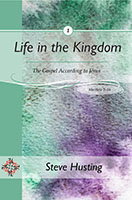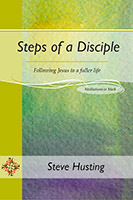People often give this response to the story in Matthew’s gospel where a lawyer asked Jesus which was the greatest commandment in the law. Jesus had answered:
Thou shalt love the Lord thy God with all thy heart, and with all thy soul, and with all thy mind. This is the first and great commandment. And the second is like unto it, Thou shalt love thy neighbour as thyself. (See Matt. 22:37-39.)
Because the passage of “Thou shalt love thy neighbour as thyself” ends in “as thyself,” it seems to imply that if we loved ourselves more, then we could love our neighbor more. Was Jesus really saying this? There are several problems with this reasoning.
First, prisons are full of men and women who loved themselves more than their victims. Unfortunately, what they loved about themselves, such as enjoying expensive luxuries that they could not afford, or needing drugs to sustain their feeling of pleasure, or to killing someone to gratify their feeling of revenge, all resulted in hurting others. So, there’s no sure proof that loving oneself more will lead to loving others more. In their perverted way, all these ways of indulging (loving) themselves ruined their lives and the lives of others.
Second, the Bible seems to indicate that we already love ourselves too much. That’s why we can’t even begin to follow this commandment, much less than the greatest commandment, which tells us to love God with all we’ve got. Why does the Bible have to tell husbands to love their wives? Why does the Bible tell us to honor our parents, stop stealing, and stop having sex outside of a committed marriage relationship? Because we are sinners who are slaves to our drives, and love to pamper ourselves, and if this means to operate outside of God’s moral rules, so be it. In too many cases, to love ourselves more merely means to feed our passions or get what we want.
Third, in this age of self-esteem (a vague condition that was introduced by, and has long been debunked by psychiatrists, but still persists in the popular imagination), it makes sense to conclude that we don’t love ourselves enough. I believe that this is cultural conditioning, which ranks right up there with our entitlement mentality. It only makes sense in a culture that has inculcated a “me first” mentality. (I used to believe in this theory myself.) But the idea is foreign to the biblical story account of man’s fall. For some of us, we don’t love others more than we do because in our selfishness, we refuse the duty to do so. Cain’s plaintive cry to God of, “Am I my brother’s keeper?” is still our mantra today.
Fourth, it is true that there are people who have poor or damaging views of themselves and therefore exhibit anti-social behavior. But just because it’s true with some members of society doesn’t mean it’s a condition that applies to all members of society. There are plenty of self-help books that seek to correct one’s self-identity to create a life of self-empowerment and happiness, all based on the idea that we have a wrong concept of ourselves. Really, how many people are picking up these books with a view to loving their neighbor more?
So, just how should we interpret Jesus’ saying? We need to understand the basics, first.
First, neither of these commandments can be followed apart from the agent of the Holy Spirit within. The entire sad, Old Testament history of the ancient Israelites testifies to this. Despite God giving them His best, they strayed from him again and again. Following the Ten Commandments and the other 600+ rules did not help them to love God or their neighbor. That is why the Bible tells us that God has rejected the Old Testament rules in favor of a new testament, which will create the righteousness in us that God demands, and lead to a people who love. The Bible paints people as sinners, people who are lawbreakers, who desire their will more than God’s will, and that includes the will to love others.
Peter, of course, is a marvelous example of a person who exerted his will before the divine Son again and again (such as denying that he would betray Him, even though Jesus plainly said he would,) but who fled from Him instead of standing by His side. When the Lord reached out to him in mercy, and when the Holy Spirit came upon him, then Peter was a changed man. The book of Acts shows what perils Peter endured out of love.
Second, this changed life is what makes the commandments possible. Peter saw the magnificent grace of God extended his way despite his shameful departure from his Lord. He clung to it and was able to dare great things for God, secure in God’s favor. The Bible tells us that God’s plan is for us to be changed into the same image of Jesus. Peter followed the selfless example of Jesus, and imitated His love, giving and expecting nothing in return. This is how we are to follow the greatest commandments: by imitating God’s love through the power of the Holy Spirit.
How do we do this in a practical way? I think Jesus is just saying that we already know how to be considerate of ourselves and take care of ourselves in sensible ways; if we show the same consideration to others, then we’ll be following this rule. I think the Golden Rule is another way of saying this law: do to others as you want them to do to you.
If I am thirsty and go get a bottle of water, I’ll look to see if my wife has a bottle nearby; if not, I’ll get one for her, too. If we are on a hike and are tired, chances are, others are tired too, and need rest. We know that what bothers us may bother others too, so we refrain from those actions. We know that we would like more clothing if we are cold, or food if we are hungry, so we already know how to reach out to the homeless men and women around us. Many of us would like it if someone would greet us in church if we’re lonely, so why not reach out to the person beside you with a greeting?
We know how to pamper ourselves in all kinds of ordinary ways; if we begin with this self-knowledge, then we’ll know how to reach out to others in love. On the other hand, when we know of our neighbor’s need, but shrink back to hoard our resources of plenty, then we know self-love at work.
Like this Q&A? Get the Doubt Busters app for your iPhone!)






